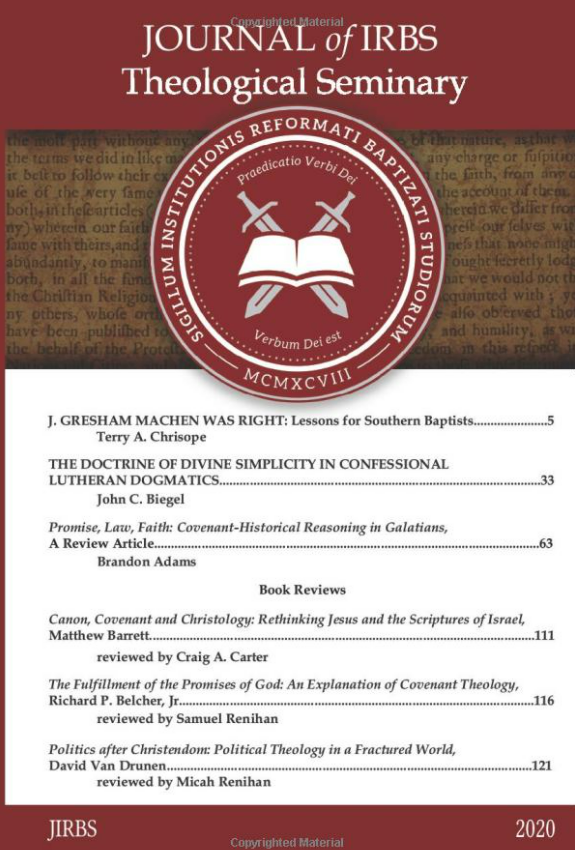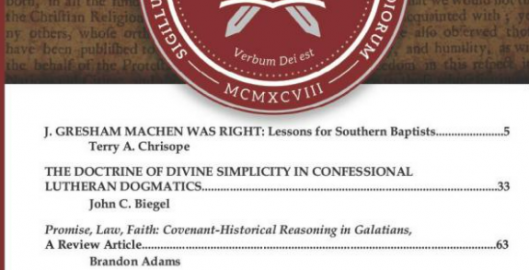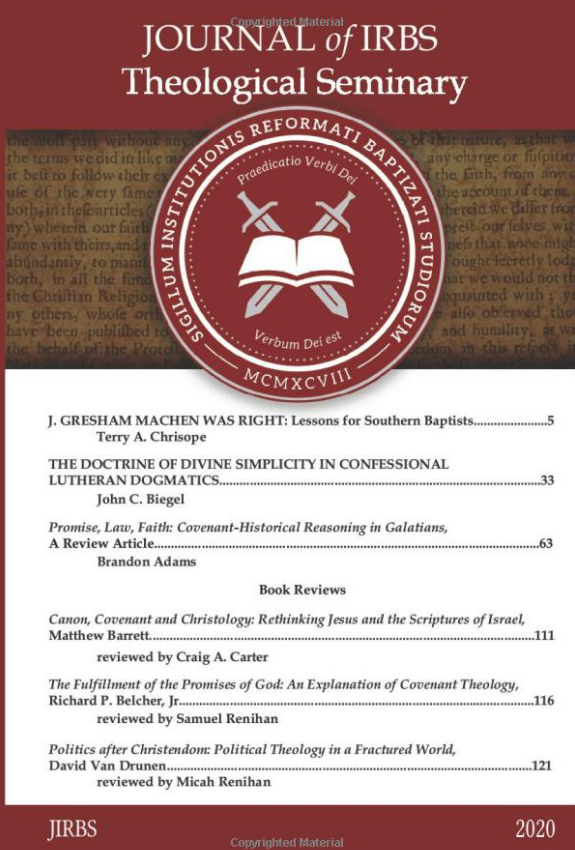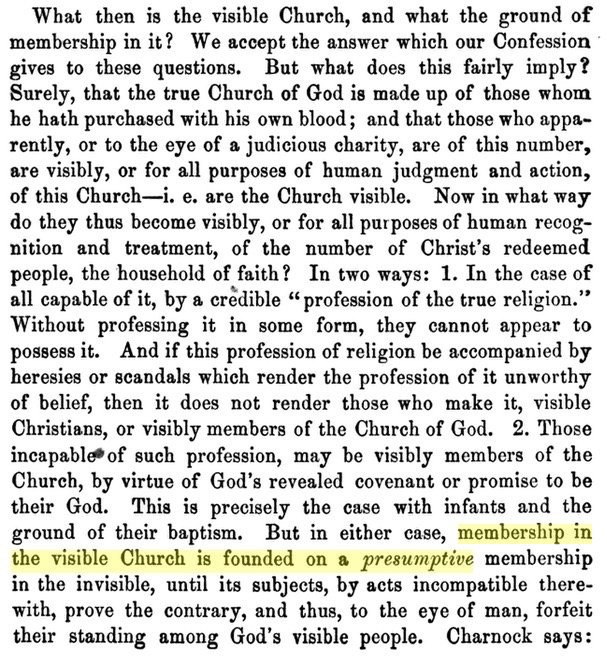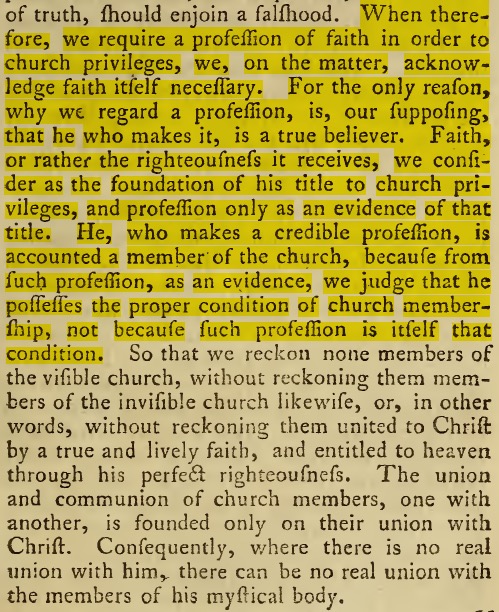galatians
1689 Federalism on Galatians (Review of Gordon’s “Promise, Law, Faith”)
On 05, Aug 2022 | In Resources | By Brandon Adams
Posted with permission.
JIRBS 2020 featured a lengthy (46 page) review of T. David Gordon’s “Promise, Law, Faith: Covenant-Historical Reasoning in Galatians.” Gordon offers an interpretation of Galatians from a subservient covenant perspective. Review author Brandon Adams addresses areas of agreement and disagreement with 1689 Federalism, using the book as a launchpad to offer a 1689 Fed explanation of Galatians 3, an often-discussed passage in disputes over covenant theology. He argues that Paul is not simply contrasting the Abrahamic “promise covenant” with the Mosaic “law covenant,” but is rather making an intra-Abrahamic argument by contrasting the distinct promises within the Abrahamic Covenant. This sheds light on Paul’s confusing argument from the grammar of the covenant in Galatians 3:16.
From the conclusion:
Promise, Law, Faith helpfully challenges the dominant Reformed reading of Galatians by insisting we must understand Paul’s temporal reasoning and his covenant distinctions. The belief that the Abrahamic, Mosaic, and new covenant are all, in substance, the same covenant does not match Paul’s thought in his letter to the Galatians. “[W]e may say with entire confidence that ‘these are two covenants’ (Gal. 4:24) can never be responsibly construed as ‘these are one covenant’” (208).59 Gordon’s recognition that Paul’s citation of Leviticus 18:5 describes the Sinai covenant of works itself, rather than a misunderstanding or abuse of it, is a crucial foundation for the eschatological law and gospel distinction, even though Gordon himself hinders this foundation by too rigidly limiting Paul’s analysis of the Sinai covenant to temporal blessing and curse. Gordon’s division of the Abrahamic covenant into three distinct promises made concerning different seed (carnal, national, corporate seed and singular, Messianic seed) is very helpful in making sense of Paul’s argumentation in Galatians (even if Gordon himself does not draw out all of the necessary implications of this).
Gordon’s denial that justification by faith alone was challenged by the Judaizers, combined with his insistence on the sub-eschatological nature of Paul’s view of the Sinai covenant, however, leads him to misinterpret key passages that are foundational to the doctrine of justification by faith alone as well as penal substitutionary atonement. His doctrine of the moral law is also unnecessarily impaired by defining ὁ νόμος as the Sinai covenant. While I sympathize with Gordon’s goals, I think more care must be taken in balancing biblical and systematic theology.60 In my opinion, the covenant theology of the seventeenth-century particular Baptists61 struck the right balance between biblical theology (including the historia testamentorum—compare WCF 7.5–6 which conflates the biblical covenants as one in substance with 2LBC 7.3) and systematic theology. However, much of that work has been polemical in nature, arguing against paedobaptism. The church would be greatly benefited from more work applying the Particular Baptist understanding of covenant theology to biblical studies. I am thankful for Gordon nudging us in that direction.
Promise, Law, Faith – A Review Article (JIRBS 20)
On 04, Jun 2021 | In Resources | By Brandon Adams
The 2020 edition of the Journal of the Institute of Reformed Baptist Studies has just been published. It includes a lengthy (46 page) review of T. David Gordon’s “Promise, Law, Faith: Covenant-Historical Reasoning in Galatians” by Brandon Adams. He argues for a 1689 Federalist interpretation of Galatians, noting where Gordon’s interpretation complements it and where Gordon’s view could be sharpened by it.
The issue also includes a brief review of Richard P. Belcher Jr.’s new book on covenant theology by Samuel Renihan.
The Reformed Baptist Academic Press website is undergoing construction so the journal is not available through the site currently. Instead, you have three options:
- Email rb@rbap.net to order with name, address, phone number, quantity. $10 plus s/h. Paid via Paypal.
- Amazon
- Galaxie (PDF)
Commentary on Galatians (James Haldane)
 James Haldane (1768 – 1851) was converted later in life and entered the ministry as a Scottish Presbyterian. Upon further study, he and his brother became baptists. Through their evangelistic efforts they planted many churches in the area. Historian Nick Needham gives an overview of their lives here.
James Haldane (1768 – 1851) was converted later in life and entered the ministry as a Scottish Presbyterian. Upon further study, he and his brother became baptists. Through their evangelistic efforts they planted many churches in the area. Historian Nick Needham gives an overview of their lives here.
James was not shy about his baptist beliefs. In addition to writing “Reasons of a Change of Sentiment & Practice on the Subject of Baptism,” he also wrote a commentary on Galatians titled “An Exposition of the Epistle to the Galatians, Showing That the Present Divisions Among Christians Originate in Blending the Ordinances of the Old and New Covenants” (1848).
(He also began writing a commentary on Hebrews, which was published posthumously from his manuscripts).
Haldane says that each of the Abrahamic promises “received a literal and a spiritual fulfillment.” For example, he notes that the promise
that God would be a God to him and to his seed after him… had its fulfilment in the riches and prosperity of Abraham, and in Israel after the flesh, being brought into covenant with God; whereby he became their God, and acknowledged them as his peculiar people. Its spiritual fulfilment was, God becoming God of the true Israel, – Abraham’s children by faith, – by a better covenant, established upon better promises.
He warns
One great means by which Satan has succeeded in corrupting the Gospel has been the blending of the literal and spiritual fulfilment of these promises, – thus confounding the old and new covenants. The former was a type of the latter, and to this the Apostle refers, in speaking of the revelation of the mystery ‘which was kept secret since the world began, but now is made manifest, and by the Scriptures of the prophets, according to the commandment of the everlasting God, made known to all nations for the obedience of faith’ (Rom 6:26). The mystery here spoken of is, the hidden meaning of God’s dealings with the posterity of Abraham, to which, in his epistles, Paul frequently refers.


